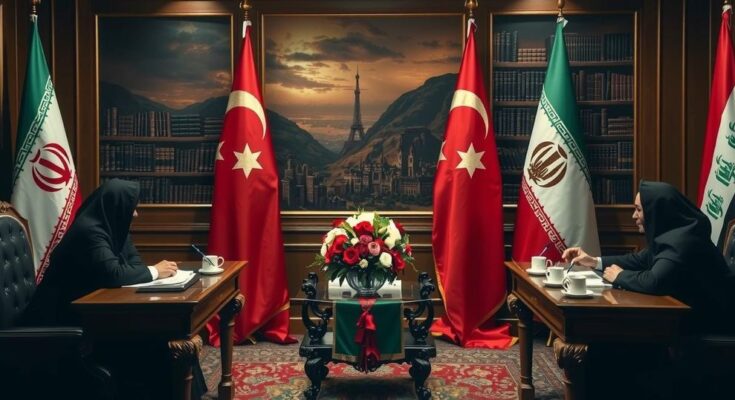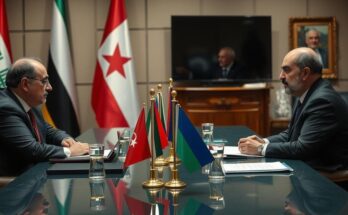Iranian Foreign Minister Abbas Araghchi visited Cairo to discuss regional tensions with Egyptian officials, focusing on the conflicts in Gaza and Lebanon. Egypt’s President el-Sissi emphasized the need for a ceasefire and humanitarian aid while reinforcing the importance of regional stability. This visit is part of Araghchi’s broader diplomatic efforts to ease tensions following a series of meetings across the region.
CAIRO (AP) — During a landmark visit to Cairo, Iran’s Foreign Minister Abbas Araghchi engaged in discussions with Egyptian officials regarding the escalating tensions across the region. This visit marks the first for a senior Iranian official to Egypt in nearly a decade. Minister Araghchi held crucial talks with Egyptian Foreign Minister Badr Abdelatty and President Abdel-Fattah el-Sissi, focusing on initiatives to reduce hostilities stemming from Israel’s military actions against Gaza and Lebanon. President el-Sissi emphasized the urgency of bringing an end to Israel’s conflict in Gaza, cautioning that an expansion of warfare would have dire implications for regional security and stability. Furthermore, the Egyptian leader advocated for a cessation of escalating violence in Lebanon and the West Bank, highlighting the necessity of facilitating humanitarian aid to affected areas. Araghchi’s visit is part of a broader diplomatic mission aimed at mitigating tensions in the region. This month, he has met with officials in various nations, including Syria, Lebanon, Qatar, Oman, and Iraq, and is expected to proceed to Turkey following his discussions in Egypt. The Iranian Minister’s diplomatic overture occurs amidst regional anxieties related to a potential Israeli offensive, which some analysts attribute to the Iranian ballistic missile assaults on Israel observed earlier this month. In a separate engagement, Araghchi met with Jordanian Foreign Minister Ayman al-Safdi in Amman to address issues of regional stability against the backdrop of ongoing Israeli actions in Gaza and Lebanon. It is notable that Araghchi’s visit coincided with a meeting between Saudi Crown Prince Mohamed bin Salman and President el-Sissi, where they deliberated on the crises in Lebanon and Gaza. The leaders underscored the need for establishing an independent Palestinian state as a critical avenue for achieving long-lasting peace and stability in the region. They collectively called for steps aimed at de-escalation, including immediate ceasefires in areas of conflict, and urged for urgent measures to address the deteriorating humanitarian situation.
The recent discussions between Iranian and Egyptian officials occur within a highly charged geopolitical landscape characterized by ongoing conflicts involving Israel and its neighboring territories. With the rise of hostilities in Gaza and Lebanon and significant diplomatic movements among Middle Eastern nations, the engagement between Iran and Egypt underscores a potential shift in regional diplomacy aimed at fostering dialogue and reducing tensions. This visit marks a significant thaw in relations following years of limited direct communication between Iran and Egypt, two pivotal players in Middle Eastern politics. The current climate is further complicated by Iran’s military activities and Israel’s corresponding military responses, which have intensified calls for diplomatic intervention. The backdrop of this meeting includes recent escalations in violence and humanitarian crises, particularly in the Gaza Strip, necessitating urgent humanitarian efforts and strategic discussions about long-term peace resolutions.
In conclusion, the discussions between Iranian Foreign Minister Abbas Araghchi and Egyptian officials highlight a pivotal moment in regional diplomacy. The emphasis on de-escalation and support for Palestinian statehood reflects a shared recognition of the need for sustainable peace solutions in the face of rising tensions and humanitarian crises. As diplomatic dialogues continue, the potential for improved relations and cooperative efforts among Middle Eastern nations remains on the horizon, contingent upon the resolution of underlying conflicts and mutual interests.
Original Source: apnews.com




